Santé
Digital health
|
As a leader in delivering health data and applying economic analysis for health policy making, the OECD supports policy makers in harnessing data and digital technology for transforming health systems. As countries aim to shift their health systems towards putting people at the centre, data and digital technologies present immense opportunities for making progress. However, they also challenge policy makers in many new ways. In the past thirty years, digital technology has transformed entire societies and the global economy. The use of data is driving evidence-based decisions and accelerating impact through analytic tools such as artificial intelligence which are having similar profound impacts. The extent of this transformation can be compared to previous industrial revolutions. But two decades into the 21st century, a similar transformation is yet to occur in health. The key to achieving a health transformation powered by health data and digital tools is no longer developing the necessary technology – smartphones, mobile apps and other software. The technology is already there. Rather focus is needed on the foundations of digital and data – the policies, interoperability standards, capacity, public engagement, and governance required for an impactful transformation. A genuine health transformation powered by health data and digital tools is a political choice. OECD work covers digital strategy, privacy, health data governance, health workforce policy, telemedicine/telehealth and artificial intelligence, among other topics. |
|
| Read the thematic chapter Digital health at a glance in Health at a Glance 2023 - OECD Indicators (November 2023) | |
FOCUS - Health Data Governance for the Digital Age - Implementing the OECD Recommendation on Health Data Governance
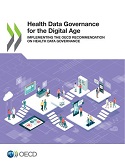 |
Health Data Governance for the Digital Age - Implementing the OECD Recommendation on Health Data Governance
|
KEY DATA
The proportion of adults seeking health information online more than doubled between 2008 and 2017.
Percentage of adults who sought health-related information online, 2008 and 2017
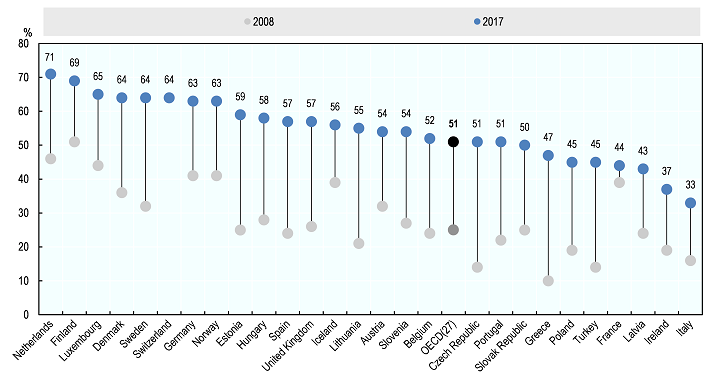
Source: OECD (2020), "ICT Access and Usage by Households and Individuals", OECD Telecommunications and Internet Statistics (database accessed on 02 April 2020).
Yet, the health sector invests less in information and communications technology (ICT) than other sectors of the economy.
Investment in software, databases and ICT services by the health sector
Investment in software and databases as a % of non-residential GFCF; purchases of intermediate ICT services as a % of output
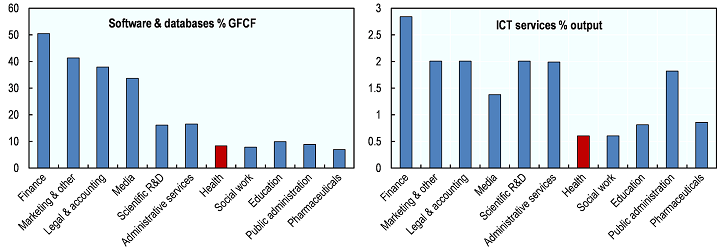
Note: Gross fixed capital formation (GFCF) is a measure of spending on fixed assets. Countries covered: Australia, Austria, Denmark, Finland, France, Italy, Japan, the Netherlands, Norway, Sweden, the United Kingdom, and the United States.
Source: Calvino, F., et al. (2018), "A taxonomy of digital intensive sectors", OECD Science, Technology and Industry Working Papers, No. 2018/14, OECD Publishing, Paris.
FURTHER READING ON OECD WORK RELATED TO DIGITISATION AND HEALTH
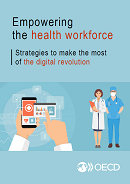 |
Empowering the health workforce: Strategies to make the most of the digital revolution
|
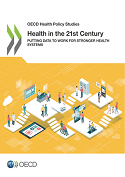 |
Health in the 21st Century: Putting Data to Work for Stronger Health Systems
|
- AI in Health: Huge Potential, Huge Risks (January 2024) (French version available here)
- The COVID-19 Pandemic and the Future of Telemedicine (January 2023)
- Towards an Integrated Health Information System in Korea (May 2022) and Towards an Integrated Health Information System in the Netherlands (February 2022)
- OECD Recommendation on Health Data Governance and Related Work (January 2017)
- New Health Technologies: Managing Access, Value and Sustainability (January 2017)
- Health Data Governance: Privacy, Monitoring and Research (September 2015)
OECD Health Working Papers
- Collective action for responsible AI in health, OECD Artificial Intelligence Papers No. 10, January 2024
- Fast-Track on digital security in health, OECD Health Working Paper No. 164, November 2023
- Progress on implementing and using electronic health record systems - Developments in OECD countries as of 2021, OECD Health Working Paper No. 160, September 2023
- Health data and governance developments in relation to COVID-19, OECD Health Working Paper No. 138, April 2022
- Empowering the health workforce to make the most of the digital revolution, OECD Health Working Paper No. 129, July 2021
- Laying the foundations for artificial intelligence in health, OECD Health Working Paper No. 128, June 2021
- Survey results: National health data infrastructure and governance, OECD Health Working Paper No. 127, April 2021
- Also check the Health data sharing intensity indicator:
Personal health data are among the most sensitive in terms of an individual’s privacy. Such data are also essential to helping make health systems more efficient, improving patient outcomes and developing new treatments. Non-fragmented and robust health data governance systems play a key role in enabling safe access to data. This indicator looks at the extent to which national health datasets may be shared with domestic and international stakeholders. The indicator value is 100% when all national health datasets may be shared with all stakeholder groups. - Bringing health care to the patient: An overview of the use of telemedicine in OECD countries, OECD Health Working Paper No. 116, January 2020
Podcasts, blogs, interviews and articles
- "We must adopt exponential thinking to see the value of digitalization", Interview in ICT & health, May 2024
- Learning From pan-Canadian Health Data Strategy – What’s Next to EHDS?, Health Podcast Network, May 2024
- Collective action for responsible AI in health, blog post by Stefano Scarpetta, Director for Employment, Labour and Social Affairs, OECD, March 2024
- Human Factor Health Data Interoperability, article in HealthcarePapers 21(4) January 2024 : 47-55.
- Data-Driven Decision Support Tool Co-Development with a Primary Health Care Practice Based Learning Network. Epidemiology and Biostatistics Publications, 186, November 2023
- OECD health report defines digital health as emerging health determinant, article in Digital Health, November 2023
- Artificial intelligence in health: big opportunities, big risks, OECD.AI Policy Observatory, August 2023
- Spotlight on Universal Health Coverage. Listen to special podcast episodes, where global experts discuss topics including financing, innovation, equity and overcoming political barriers, to shine a spotlight on Universal Health Coverage as a critical health issue. The Lancet, May 2023
- "Vlagajte v ljudi, na katere bo imela preobrazba največji vpliv", siol.net (May 2023), in Slovenian
- A conversation with Dr Eric Sutherland, Digital Health Lead, OECD, on digital health ecosystems and the three layers of digital tools, integrated data and trusted analysis: listen to the EHDEN podcast (March 2023)
- An international perspective with the OECD on utilising RWD for healthcare system benchmarking and information systems with Jillian Oderkirk: listen to the EHDEN podcast (March 2022)
- Tiago Cravo Oliveira Hashiguchi, Jillian Oderkirk, Luke Slawomirski, Fulfilling the Promise of Artificial Intelligence in the Health Sector: Let’s Get Real, Value in Health, 2022, ISSN 1098-3015, https://www.sciencedirect.com/science/article/pii/S1098301521032253
- Opportunities and Challenges of Blockchain Technologies in Health Care, Policy Brief, part of the Blockchain Policy Series (December 2020)
- Variations in Telemedicine Across the World: Q&A with Tiago Cravo Oliveira Hashiguchi, To the Point (blog), Commonwealth Fund, (November 2020)
- Artificial intelligence in health still needs human intelligence, blog post in the OECD.AI Policy Observatory, September 2020
- The COVID-19 telemedicine boom provides clues for policy makers seeking to mainstream its use, blog post for the Swedish Forum for Health Policy (September 2020)
- Colombo F., Oderkirk J., Slawomirski L. (2020) Health Information Systems, Electronic Medical Records, and Big Data in Global Healthcare: Progress and Challenges in OECD Countries. In: Haring R., Kickbusch I., Ganten D., Moeti M. (eds) Handbook of Global Health. Springer, Cham.
Find out more about our work on Health
OTHER RESOURCES
The OECD Going Digital Project
Led by the OECD Committee on Digital Economy Policy (CDEP)
To bring about stronger and more inclusive growth from the digital transformation, it is essential to build a coherent and comprehensive policy approach. This is the essence of the OECD Going Digital project. Led and co-ordinated by the OECD Committee on Digital Economy Policy (CDEP), the project draws on and connects the expertise of 17 OECD committees, including the Health Committee.
- The OECD Policy Framework on Digital Security: Cybersecurity for Prosperity (December 2022) charts the economic and social dimension of cybersecurity, highlights the OECD approach to digital security policy and equips policymakers to use OECD digital security Recommendations in developing better policies. The Framework also identifies linkages with other policy areas addressed through existing OECD standards and tools.
- OECD members adopted several legal instruments in 2022, acknowledging the essential work for a global approach to digital security:
- Declaration on a Trusted, Sustainable and Inclusive Digital Future
- Declaration on Government Access to Personal Data held by Private Sector Entities
- Recommendation of the Council on Digital Security Risk Management
- Recommendation of the Council on National Digital Security Strategies
- Recommendation of the Council on the Treatment of Digital Security Vulnerabilities
- Recommendation of the Council on the Digital Security of Products and Services
OECD.AI Policy Observatory: Focus on Health
This webpage provides the latest on artificial intelligence (AI) and health. In healthcare, AI systems help diagnose disease and prevent outbreaks, discover treatments, tailor interventions and power self-monitoring tools. They can facilitate personalised healthcare and precision medicine.
AI is transforming every aspect of our lives. It influences how we work and play. It promises to help solve global challenges like climate change and access to quality medical care. Yet AI also presents challenges for businesses and citizens alike.
The OECD Artificial Intelligence Policy Observatory, established as part of the Going Digital Project, aims to help countries and others shape policy and institutional frameworks for the development of trustworthy AI that benefits society as a whole, guided by the OECD AI Principles.
- Trustworthy AI in Health: read the background paper for the G20 AI Dialogue, Digital Economy Task Force, Saudi Arabia, 1-2 April 2020
The OECD Global Blockchain Policy Centre
Led by the OECD Committee on Financial Markets (CMF) in cooperation with the Committee on Digital Economy Policy (CDEP).
Blockchain and its underlying distributed ledger technology have the potential to fundamentally transform a wide range of industries and markets. The Global Blockchain Policy Centre is exploring the benefits and risks of blockchain for economies and societies, beginning to identify good policy and regulatory approaches, and investigating uses in specific policy areas.
CONTACT US
For more information, please contact:
- Mr Eric Sutherland: Eric.Sutherland@oecd.org
- Mr Rishub Keelara: Rishub.Keelara@oecd.org

Follow us on Twitter @OECD_Social
Documents connexes
